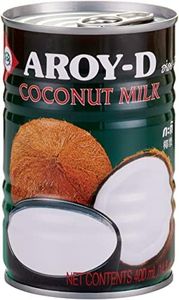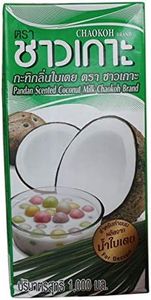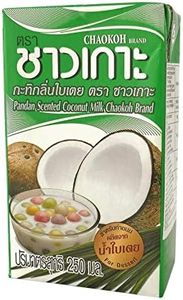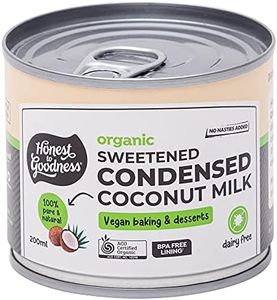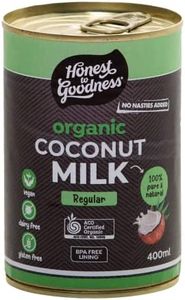We Use CookiesWe use cookies to enhance the security, performance,
functionality and for analytical and promotional activities. By continuing to browse this site you
are agreeing to our privacy policy
10 Best Coconut Milks
From leading brands and best sellers available on the web.By clicking on a link to a third party's website, log data is shared with that third party.
Buying Guide for the Best Coconut Milks
Choosing the right coconut milk can make a big difference whether you’re adding creaminess to a curry, making a smoothie, or looking for a dairy-free alternative for baking. There are many types and variations, so knowing what to look out for will ensure you get the best product for your needs.Consistency (Thickness)Coconut milk comes in various consistencies, from thick and creamy to more watery. The thickness is determined by the concentration of coconut extract and water. Thick coconut milk is rich and creamy, great for curries, desserts, and sauces where a robust coconut flavor and thicker texture are desired. Thin coconut milk, which has more water added, is more suited for soups or for drinking as a milk substitute. Consider your intended use: go for thicker options for rich dishes and choose thinner ones for lighter applications.
Ingredients and AdditivesThe ingredient list can tell you a lot about the purity and quality of coconut milk. The most basic coconut milk will have just coconut and water. However, some brands add gums, stabilizers, emulsifiers, or sweeteners to improve texture or shelf life. For those seeking fewer additives and a more natural product, look for those with minimal ingredients. If you are concerned with specific additives due to allergies or dietary preferences, make sure to read the label carefully.
Sugar ContentCoconut milk can be found in sweetened and unsweetened varieties. Unsweetened coconut milk contains just coconut and water, which is ideal for savory dishes and for controlling sugar intake. Sweetened varieties are typically used in desserts or for drinking. Decide based on whether you want your dish or drink to be sweetened; pick unsweetened for more versatility if you plan on using it in different types of cooking.
Fat ContentThe fat content in coconut milk gives it its creamy texture and rich flavor. Full-fat coconut milk is best for curries, baked goods, and desserts, as it provides thickness and body. Light coconut milk has had some fat removed, making it thinner and less rich, and is suitable for those looking for a lighter texture or fewer calories. Think about whether you need creaminess or prefer a lighter option to choose the right type.
Packaging TypeCoconut milk comes in cans, cartons, and sometimes in powder form. Canned coconut milk usually means it’s higher in fat and suitable for cooking, while carton versions are often more diluted and geared toward drinking or using as a dairy alternative in coffee or cereal. Powdered coconut milk can be convenient for storage and travel, as it can be reconstituted when needed. Consider your storage space, shelf life needs, and how you’ll use the coconut milk to pick the right packaging.
Organic and CertificationsSome coconut milks are labeled as organic or carry certifications like non-GMO or fair trade. Organic coconut milk is made from coconuts grown without synthetic pesticides and fertilizers. Certifications can also reflect environmental or ethical production practices. If these attributes are important to you, check the packaging for these designations to support your values.






